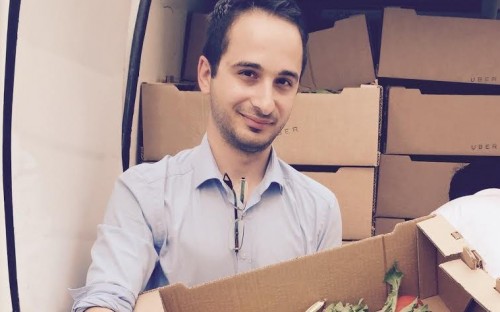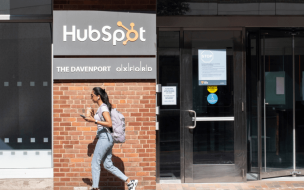After an MBA at HEC Paris, the tech wizard landed a top job at Uber and, despite violent backlash from the local taxi industry, masterminded the launch of the controversial taxi-hailing service in the Greek capital.
Previously, Vasilios worked in brokerage in Greece and made an early foray into entrepreneurship: he started up a media business to help teach kids math and English online.
He moved on to study software engineering and artificial intelligence at the University of Edinburgh — where he helped build a computerized soccer-playing robot from scratch — before working as a tech analyst for consultancy firm Accenture. He also starting his own consulting firm.
When BusinessBecause last spoke to Vasilios he had just started his MBA in Paris and had his eyes set on Silicon Valley and a career in entrepreneurship. Yet the opportunity to work for Uber was too good to turn down.
Despite interviewing at Google, Vasilios decided to move back to his home city to join Uber and work in an environment completely different to anything he’s experienced before.
Why did you choose to work at Uber after your MBA?
I was excited by the challenge!
I interviewed for a product manager role at Google in London but I couldn’t get very enthusiastic about it. It’s a big firm with a good brand name but these roles are quite opaque. You don’t know what product you’re going to be working on.
At Uber, I knew exactly what I would be doing: trying to introduce the product and grow the service in Athens. I knew that if I could pull it off, it would be a pretty strong accomplishment.
Has Uber been a success in economically troubled Greece?
We’ve launched Uber X here and it’s growing. It was not easy, I can tell you that. There was a huge backlash from the taxi industry.
The capital controls which were imposed on Greece over the summer meant we also had trouble processing payments and you can imagine how difficult it was to gain media attention with the country in political turmoil and elections taking place every few months.
Of course, Uber’s strongest weapon is word of mouth. So we have been able to grow very quickly in spite of these problems.
What advice do you have for MBAs looking to work for Uber?
Find a role that you’re really excited about and focus on it.
In the interview, you need to be in the mind-set of being an actual consultant [who is] trying to solve real-life problems. There is a “brain-teaser” element to it, where you do market-sizing or look at a case study, but it is always applied to a real situation.
You should know a lot about the particular city you’re interviewing for. If Uber is already there, you should speak with drivers, use the service and come up with ideas for how it could be improved.
Can you tell us something about working at Uber which most people wouldn't know?
Uber is famous for its entrepreneurial atmosphere. But I think it’s difficult to grasp the openness, collaboration and flatness of an organization that has grown to more than 5,000 employees expanding more than 360 cities, 66 countries and six continents.
On a daily basis you can collaborate with people [from] all over the world. Many companies are global and you can pick up the phone and talk to everybody. But we actually do it.
What are your thoughts on the future of the sharing economy and Uber’s role in it?
The sharing economy is here to stay. Although it’s going to displace traditional business models in particular segments, it will not completely replace these models.
If you take Airbnb for example, while there’s definitely a market for people looking to rent out a flat for a few days, there’s still a huge need for hotels, both for the added capacity they bring to the marketplace and the more premium services they can offer.
Uber’s goal is not to revolutionize the taxi industry. The aim is to make better use of vehicles in any city and to benefit consumers — both riders and drivers. The potential to better utilize idle resources is a good thing both for individuals and the planet in general.
Why did you decide to pursue an MBA at HEC Paris?
In my previous career I was limited within the scope of IT. An MBA was the best way to switch into different areas at a point in time which made sense both to myself and to my employers.
HEC is comparable to Harvard in the US or Oxbridge in the UK in terms of its reputation.
The length of the course, the size of the cohort and the campus location were all ideal. You can enjoy the forest, the lake and nice sports facilities and be just half an hour away from the center of Paris.
What are your plans for the future?
I’m comfortable in Athens and my work at Uber has been very interesting from day one.
But you never know what exciting opportunities might arise. Having an MBA means you get people knocking on your door on a regular basis.
RECAPTHA :
47
b3
cc
47








